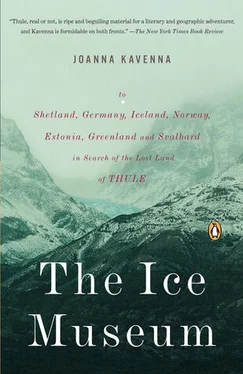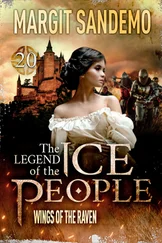The ship moved slowly through the matted whiteness of the North Sea, which the Romans had called Ocean, after the mythical Ocean of the Greeks. The briny sea, the resistant waves, convinced them they had found Thule, when they arrived in Britain. It was near Thule, they thought, that Pytheas saw the sea congeal, and become a thick paste. There was a poem by Pedo—a man admired by Seneca—which described the sinking of the Roman Germanicus’s fleet in the North Sea, a fleet that had dared to pass through the shadows towards the final shores of the world. The fleet had been destroyed, Pedo thought, by the force of Ocean, a sea scattered with sea beasts. Tacitus agreed: Germanicus had succumbed to Ocean, a sea so wide and deep that it was thought to be the final one, unbounded by land.
On the maps of the Ancient Greeks the inhabited world was drawn in the shape of a dinner plate, surrounded by water. An idea more ancient than Thule, Ocean surrounded the known world. Beyond Ocean, the Hesperides, the progeny of Dark Night, tended the golden apples, and their trees. Ocean spilled out offspring, beginnings and ends; it was the origin of life and the nothingness surrounding the boundaries of the known world, the creating force and the void. A people called the Cimmerians lived a miserable life on the shores of the deep and endless stream of Ocean, near the entrance to the Underworld, their city covered with mist and cloud, constantly under dismal night. One of Ocean’s daughters was Styx, the river the dead crossed to reach Hades; Ocean was a force of nature incorporating foul decay and blackness, as well as generation and lightness. In the Odyssey , the path to Hades went through Ocean, to a narrow strand where there were tall black poplars and willows with wasted fruit on their branches.
Even after Pythagoras proposed that the earth must be a sphere, the idea of the gaping emptiness of Ocean was not dispelled. Water was a powerful and prohibiting element to the Greeks; they devised maps depicting a vast sea crossing the world like a belt, running through both the Poles, and another belt of water round the earth between the tropics. But there were Greeks, like the early historian Herodotus, who denied the existence of Ocean altogether. Herodotus thought Homer or some earlier poet had invented the name Ocean. It was absurd, he wrote, that the mapmakers added a fiction to their maps, showing Ocean running like a river round a perfectly circular earth.
The Romans believed that nothing could be beyond the reach of their empire, even the strange land of Thule. It was inter-civilizational one-upmanship, thinking they had outdone the Greeks by solving the mystery of Thule. But the Romans stopped too soon, at the first remote land they found in the torpid ocean. As the Victorians sailed through the stormy northern ocean, Shetland seemed too far south to be Thule. It was too much like home for the Victorians, who were sailing north in search of the unheimlich —the German word which means uncanny but which contains within it the sense that the uncanny is anything ‘unhomelike,’ anything unfamiliar. Shetland was a beautiful island of cliffs and peat scapes, but the Victorians found it insufficiently strange to be Thule. They were brutal where Thule was concerned, refusing to let national sentiment intervene in a myth trail. But they were thorough, so they enjoyed the detour, as a nod to former empires.
They arrived in Lerwick, the main town on Shetland; they walked dutifully around the port, looking at the houses with crow-stepped gables. They made careful notes in their diaries. The bogs stretched across the low hills; the snowy quartz-veined rocks shone against the yellow fields of oats and barley. There were willows and maple planes, hanging their shade over the broken ruins of cottages. There were ducks and geese everywhere, gulls more numerous than the cocks and hens, and salt-fish lying piled on the sands. The industrious women crowded the markets, some carrying crates of peat, some spinning yarn and knitting stockings.
I arrived in Lerwick under a cold sky, the wind blasting through the sallow streets. The town was a series of stone houses, a main street and a road snaking towards the harbour, where the sea splashed against the docks. Beyond the outskirts stood the dark green cliffs, and the long valleys stretching inland. The mist hovered low on the rocks around the town, on the matted grass hills, breathing across the plains. There was an old fort at the end of the main street, with a set of cannons pointing out to sea, pointing towards the passenger ferry I had arrived on, still looming above the buildings, waiting to leave. The wind whipped in from the sea, racing between the buildings, ripping at the awnings on the boats in the harbour. A gaff-rigged boat moved past, its sails stretched by the wind.
There was a bar called Thule by the quayside, which looked like an extension to a prison, its exterior dank and salt-stained. It sat on the harbour road, a torn notice taped to the window, addressed to Norwegian sailors. VELKOMMEN TIL THULE! the notice read. Welcome to Thule. An ancient land, and now a bar, far more convenient for the weary sailor recently arrived on a ship from Norway. Inside were chrome walls and stools, in Scando-minimalist design. A Nordic home-from-home. Hammering on the window, I persuaded the barman to open the door, and asked him why the bar was named Thule. He propped himself up against the frame, looking tired. Perhaps it was too early in the morning, perhaps the wind was whipping my words away, but he was reluctant to talk. ‘Don’t ask me, I just work here,’ he said.
He was a strawberry blond, pulling on a jumper as he stood in the doorway, squinting in the cold light. The skin around his eyes creased into intricate lines as he spoke. He grimaced at the wind, which gusted against the door, almost slamming him back inside. I raised my voice, as the wind became a howl echoing around the quayside buildings. ‘What do you think?’ I tried to shout. ‘Do you think Shetland was Thule?’
He shrugged again. ‘I really couldn’t say,’ he replied, his face blank. And then, more hospitably, ‘Come back later, you’ll see a real old get-together.’ And he waved me back into the wind.
In a chorus, Greek in its fatalism, the locals I spoke to mourned the recent refurbishment of Thule, the turning of everything to chrome. The Thule Bar had once been a place of character, they said, where you might have bumped into a business lunch, a drunks’ party, and a wedding reception, all on the same day. But in the evening the bar was always full, the chrome walls slick with sweat, and the shining floor sticky with beer.
The morning was cold and gaunt and the streets were jaundiced, stained by the pale sun. I lingered under the grey terraces, as the gulls circled and the rain slammed onto the slate. At noon the ferry moved slowly out of the port. The streets grew busy, and I walked past the Crystal Shop, the Harbour Café, with its stream of damp sailors waiting at the window for chips, the shop selling Shetland knitwear, which was also called Thule. Thule was having a quiet time of it in Shetland—the people I asked were polite but baffled, as anyone might be, stopped by a stranger on a windy street, and asked about a land called Thule. Thule was elusive, even in a former Thule, and the people of Lerwick weren’t setting too much store by it.
But they lived on a quiet island, a ragged and wild island, a place where winds gusted across the harbours and battered the buildings. It was a land of moss plains, peat stretches and bright green islands lapped by sea froth. A place of gashed mountains, inky tarns and streams. The rain drew a rich smell of peat from the drenched valleys. A short walk out of Lerwick, I found a deserted coastal path winding across slippery stones, from where I watched the surge of waves across the beach. My only company was a shy cat stalking along the path, which squeezed under a fence and disappeared. As the day drew on, the sun grew stronger in the sky, drying the sides of the houses, gleaming on the rocks.
Читать дальше












